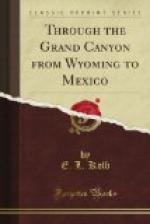Emery had no desire to follow my passage and crossed back to the other side. Shooting over the upper end of the rapid, his boat ran up on a rounded rock, the stern sticking high in the air; it paused a moment, the current slowly turning it around as if on a pivot, and the boat slid off; then down he came lurching and plunging, but with no more difficulty. Many times in such places as these we saw the advantage of our flat-bottomed boats over one with a keel, for these would surely be upset when running up on such a rock.
CHAPTER X
HOSPITABLE RANCHMEN
The appearance of Desolation Canyon had changed entirely in the lower end. Instead of a straight canyon without a break, we were surrounded by mountain peaks nearly 2500 feet high, with many side canyon between them and with little level parks at the end of the canyons beside the river. The tops were pine-covered; cedars clung to the rocky slopes. Some of these peaks were not unlike the formations of the Grand Canyon, as seen from the inner plateau, and the red colouring was once more found in the rocks.
These peaks were gradually dropping down in height; and at one open section, with alfalfa and hay fields on gently sloping hillsides, we found a small ranch, the buildings being set back from the river. We concluded to call and found three men, the rancher and two young cowboys, at work in a blacksmith shop. Emery had forgotten to remove his life-preserver, and the men looked at him with some astonishment, as he was still soaking wet from the splashing waves of the last rapid.
When I joined him he was explaining that no one had been drowned, and that we were merely making an excursion down the river. Mr. McPherson, the rancher, we learned, owned all the cattle seen up the river. The little cabin at our last camp was a sort of headquarters for his cowboys. The cattle were just being driven from the mountains before the snows came, and were to be wintered here in the canyons. Some of these cattle were much above the usual grade of range cattle, being thoroughbreds, although most of them ran loose on the range. This ranch had recently lost a valuable bull which had been killed by a bear up in the mountains—not unlike similar conflicts in more civilized sections of the country. McPherson camped on this bear’s trail for several days and nights before he finally hung his pelt on a tree. He was a large cinnamon-coloured grizzly. Four other bears had been killed this same year, in these mountains.
McPherson’s home had burned down a short time before our visit, and his family had removed to Green River, Utah. A number of tents were erected, neatly boarded up, and we were informed that one of these was reserved for company, so we need not think of going any farther that day. These men, while absolutely fearless in the saddle, over these rough mountain trails, had “no use for the river”




